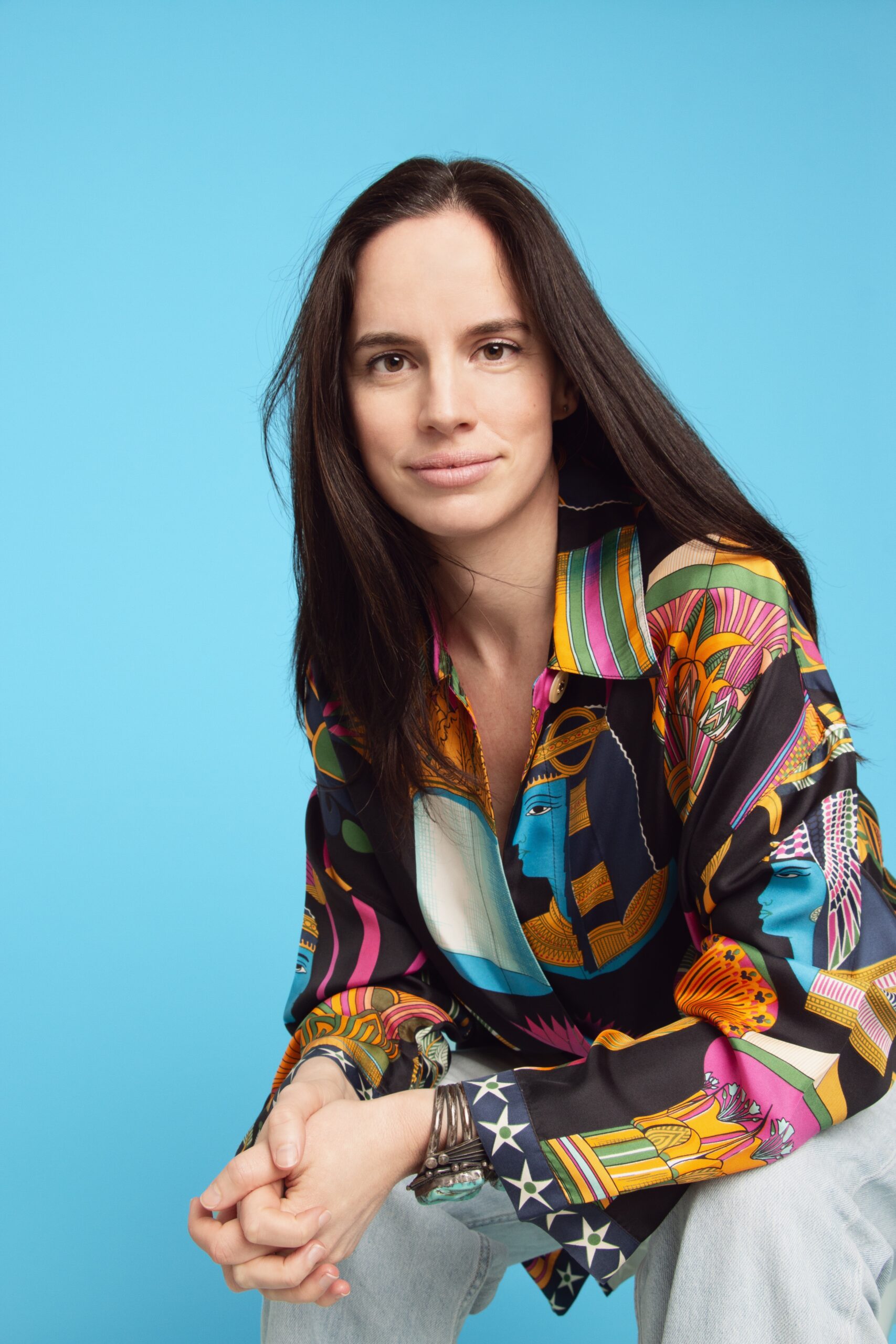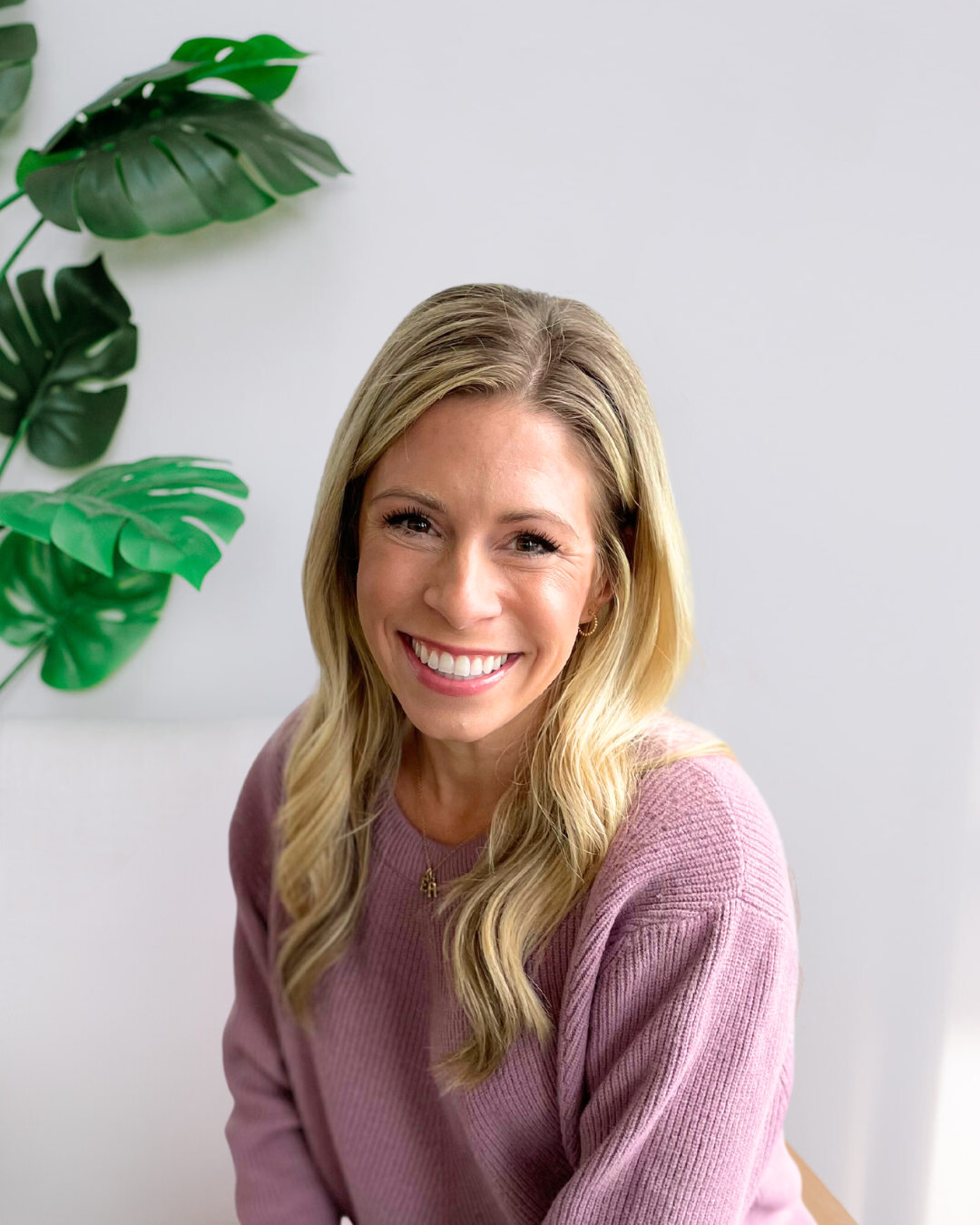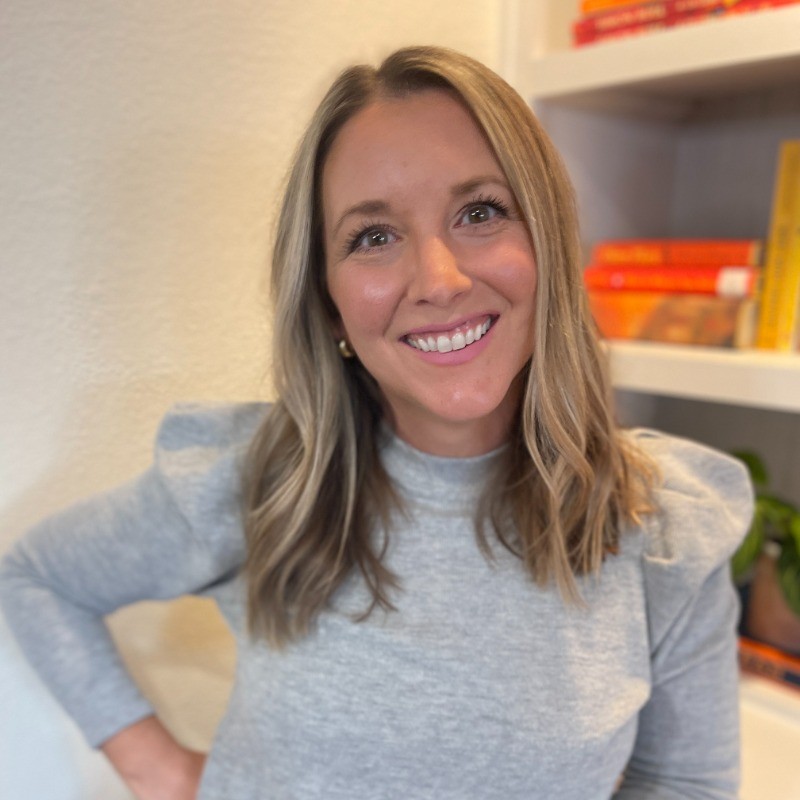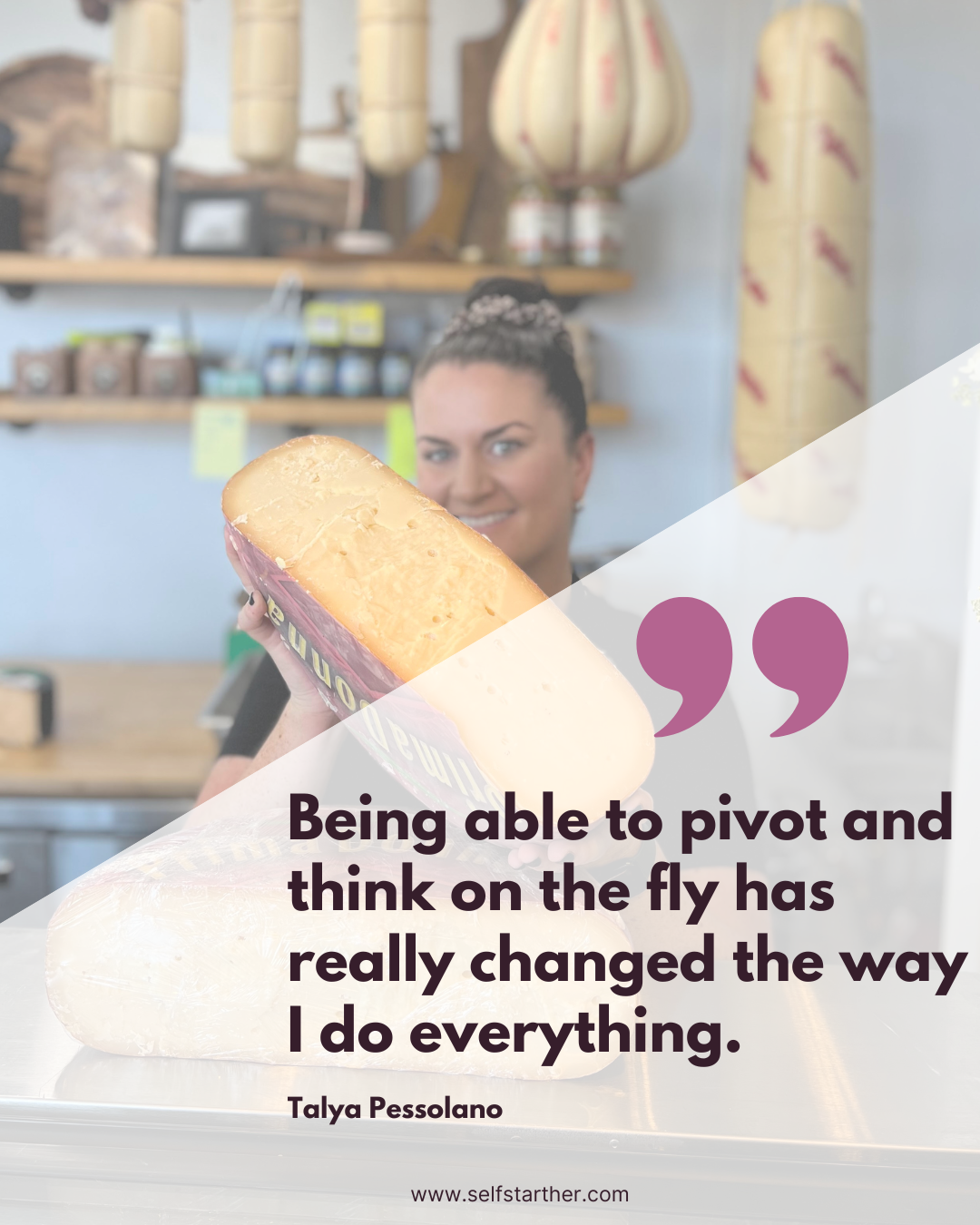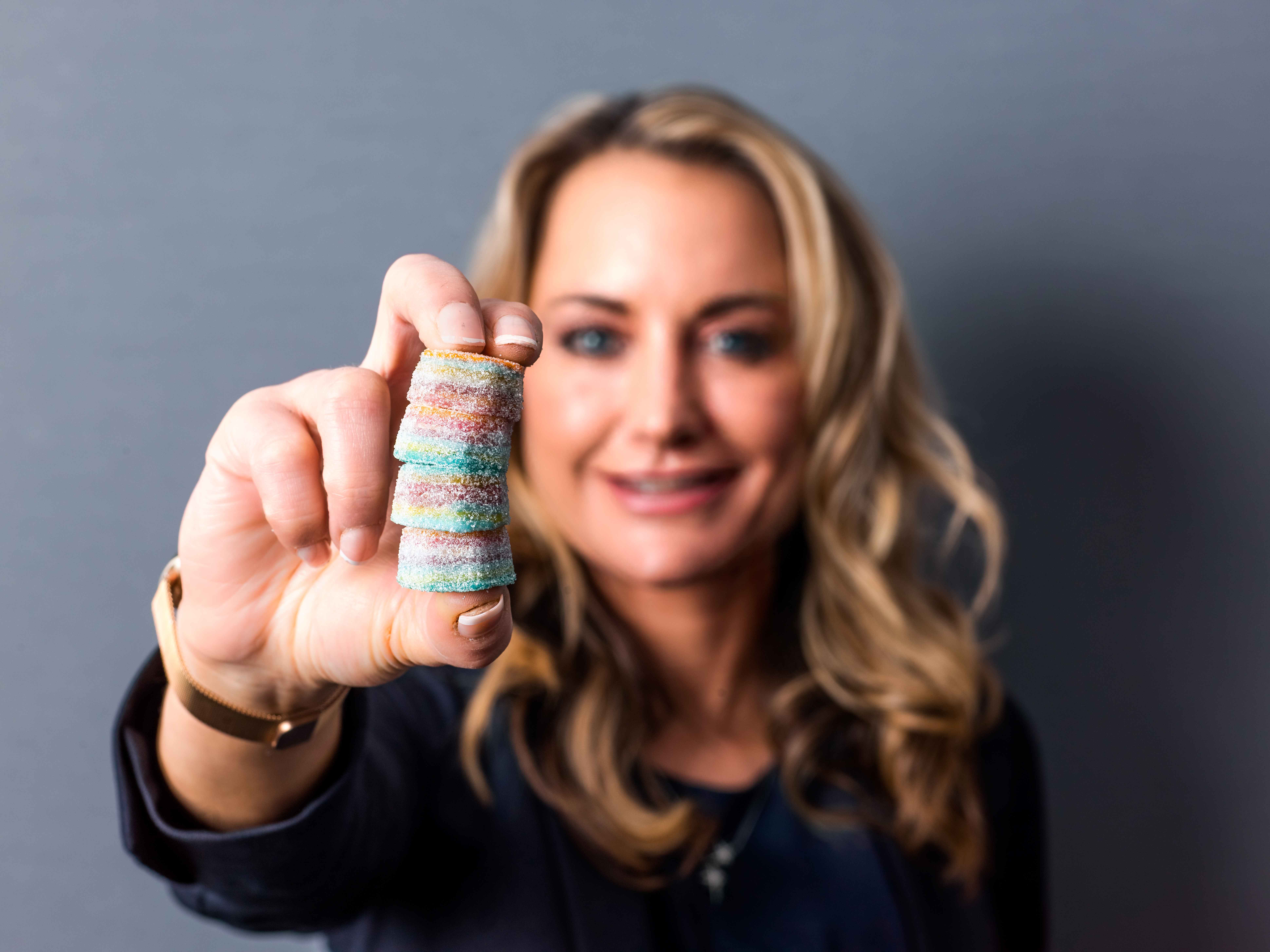Katharine Campbell Hirst, Coach and thought partner for women entrepreneurs and executives, shares her uncommon story and journey from burnout to entrepreneurial success as an entrepreneur and coach. She emphasizes the importance of aligning your business with who you truly are and finding joy in running it.
Katharine also discusses the impact of shadows and coping mechanisms on our entrepreneurial journey and the need to address and overcome them.
Hear Katharine’s advice for aspiring entrepreneurs is to build a business that aligns with their true selves and to give themselves permission to make changes along the way.
Key Takeaways:
- Align your business with who you truly are and find joy in running it.
- Address and overcome your shadows and coping mechanisms to thrive as an entrepreneur.
- Give yourself permission to make changes and evolve your business as needed.
- Consider working with a coach to gain clarity, support, and guidance on your entrepreneurial journey.
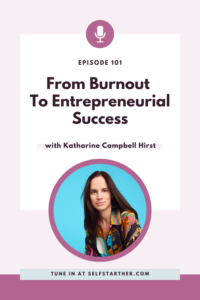
Connect with Katharine:
Connect with Katharine on Linkedin
Sign up for Katharine’s newsletter
Want to work with Katharine? Mention Self StartHER and receive 30% of an Exponential Clarity Session
Stay Connected with Self StartHER:
Subscribe to the Self StartHER podcast for more inspiring episodes.
Follow Self StartHER on Instagram for updates and behind-the-scenes insights.
Transcript
Megan Tobler (00:01.438)
Catherine, I’ve been so looking forward to today’s conversation, so welcome to the Self-Starter Podcast.
Katharine Campbell Hirst (00:06.902)
Thank you, I’m very pleased to be here.
Megan Tobler (00:09.146)
Yes, now I know today you are a coach and thought partner for women entrepreneurs and executives, but I have to ask on your website, I saw that you say that your story is an uncommon story with an uncommon goal. So I’d love to learn a little bit more about Catherine and this uncommon story of yours.
Katharine Campbell Hirst (00:27.642)
Ah, sure. Well, where to start? I mean, to start at the very beginning. I was born in Caracas, Venezuela, but I’m not Venezuelan. My parents were working there at the time I grew up living in five different countries. I had what is in England now an atypical but certainly for Americans atypical education. I went to boarding school when I was 10. And like, did that and went straight to college. So I basically left home when I was 10.
And then I had like this incredibly eclectic career. So I’ve worked in like, depending how you want to count it, like eight or nine industries. I’ve worked for some very famous people. I’ve done a bunch of like very different things. So that’s the uncommon. There’s a very brief outline of the uncommon story and I know we’ll come back to a lot of that. And then I think the sort of uncommon goal, I’m like very obsessed with entrepreneurs and entrepreneurship and innovation. And…
When I originally became very obsessed with entrepreneurs, it was sort of before the whole world was obsessed with them. Like it was pretty early on in my 20s. I was working for like a think tank inside a big company, Accenture. And I was sort of young and interested. Like it was like, it’s one like no one knew what Android was and like people who just got like proper phones. I’m aging myself desperately. But like, so I was just very interested with entrepreneurship for a very long time.
And then originally as a business and then from the business angle and then realized I was fascinated by it from essentially it’s a spiritual quest. It’s like, you have to, you know, this, you have to like, unblock every single bit of you excavate every little thing to become the biggest version that you can be so your company can be that too. And yeah, that just became my quest. I became super interested in it.
Megan Tobler (02:12.598)
That’s amazing and I know that you mentioned that you had this opportunity to have like a very, the term used was eclectic, there we go, let me say that again. You had a very eclectic background as far as all the different opportunities that you had to work in throughout your career. So at what point did entrepreneurship really come into the mix here throughout all of these different experiences?
Katharine Campbell Hirst (02:35.638)
Well, so I mean, I’ve literally done every flavor, like I’ve worked in a big company, I’ve been a solo like freelancer, I’ve worked in startups, I’ve done consulting, I’ve done like every single, almost every single scale. And for you know, until literally the last three years, since I have my daughter, which is when I like fully owned that I am an entrepreneur. For most of my career, I was very interested in entrepreneurship as like, something other people did. I was gonna support other entrepreneurs. I was a chief of staff to one, I was a speech writer for one. It was like this very much like, I’m going to be the person behind the person, was very much how I saw myself for a very long time. I very much saw myself as like, I don’t have the big ego, I don’t need my name on the door. Like, I’m gonna be that support. And obviously a coach is still in that role.
But at the same time, you know, the very confronting thing about building a coaching practice is my name’s on the door and like now it is on the door and it is not about me because it’s about my clients, but it is about me because that’s how I get my clients. Um, and I’ve been forced to face all these sort of ego questions that I was very much trying to avoid, um, for a long time. So yeah.
Megan Tobler (03:49.01)
Now, why do you think that was something you were trying to avoid?
Katharine Campbell Hirst (03:53.054)
Um, I think, look, I think it’s a combination of lots of things. I, um, as a child, I was very unpopular. I was bullied. I was very, you know, like safety was not being the center of attention. And I really like, didn’t, didn’t learn or want that. I mean, I literally, like, when I was a school player, I was like managing the props, I was like, not even on the stage. Like I was very much like not in the limelight. And.
You know, one of the coping mechanisms I learned when I was very young, I describe myself as I was an incredible comedian. I could just, you know, I went to schools in six different countries. I just like I’m only child. Right. So I was I didn’t have that a tremendous amount of like other people around me at home. And then I was constantly in these new environments. And I learned very quickly how to read a room, figure out what everyone wants to give it to them. And as I did that.
that became like an incredible superpower for the first part of my career, right? I had a very, like I went up the sort of corporate and then startup ladder faster than almost any of my peers did. And like all these like childhood coping mechanisms were very good for me, right? Like I could think, I could talk to very senior people because part of the only child thing is you talk to grownups your whole life. So like I could talk to all the grownups in the room and I like understood how to read things and figure out what the client wanted and be just.
you know, just funny enough, but cute enough, but serious enough, and whatever that dance is to get where I needed to go. And at the time, you know, the serve me very well. And I didn’t realize it was not helpful. And then at some point, and you know, I had the burnout moment where like trying to please everyone wasn’t working for me anymore. And I really had to unpack all of these players and mechanisms I built and be like, but what do I really want? Who am I in the center of all of that?
And I think once I started re-centering myself in that way, the entrepreneurship thing became more inevitable because suddenly I was no longer willing to be the person behind the person.
Megan Tobler (05:51.678)
Well, and it sounds like you had this innate desire within you because obviously you were really interested in entrepreneurism since you went on that quest to really understand all about entrepreneurship. So it was in you, but it sounds like you were suppressing it because of outside influences, but eventually it just came out. It was like, hello, here I am. You weren’t able to push it down any longer. And finally you’re
Katharine Campbell Hirst (06:13.454)
Thank you.
Megan Tobler (06:18.738)
Your name is on that door essentially now. You’re not just the person behind the scenes. You’re the actual conductor for the whole thing.
Katharine Campbell Hirst (06:27.37)
Yeah, absolutely. It’s been a wild ride. And I do think that, you know, I’ve alluded to this, but that is the gift in when you finally step into that part of yourself is you have to, you know, I think a lot of the early struggles were around, like, do I feel safe to be seen? Do I feel safe to be visible? Right? Like, you’ve got to put yourself out there on social media. And we live in a world where like
all these people from high school who may have said all those things and do all those things that hurt so much when that like mattered so much when you were that young, right? And they can all see all this stuff. And suddenly, I’m like, I think this about, you know, feminine energy about business strategy or whatever. And I’m like, you know, I got to get out of your head and keep going. Right. So
Megan Tobler (07:10.322)
I can completely relate, but I have to, because I went through a lot of very similar things as far as like feeling like people were going to judge me and oh my goodness, what is this person gonna think? But at a certain point, it’s your life. So it’s like, do I wanna just think about what if, or do I wanna actually know what could happen if I went for it? And I think it’s really liberating personally, once you just decide to go for it and you realize that you’re.
probably a very small portion. I mean, we think we’re bigger in someone else’s life than we really are. So, I mean, think about when you’re scrolling through social media, you might look at something, you might have a little thought, but then it passes because you’re onto the next thing. So I think it’s us getting, pushing away, pushing down all of that, like self negativity that we have and limiting beliefs and just going for it like you did.
Katharine Campbell Hirst (08:05.054)
Oh, I couldn’t agree more. I think, you know, they talk about how the brain maximizes negative things, seven X versus the positive things, right? And since I started doing this, right, anytime any of my friends do anything on social media, I’m like, I love this, go, because I realized they need like seven people saying, I loved it, whatever, for every like one negative comment that they get, that they even imagine, right? Because when I think about the parts of me that were feeling unsafe,
they weren’t even the real people. It was like the version of that person that’s been living rent free in my head for the next 30 years or whatever it is, right? It’s not the actual person because I don’t even know what these people are doing now. I’ve no like, it’s like an avatar that I’ve been carrying around and beating myself up with.
Megan Tobler (08:54.71)
Totally. Well, I want to talk about this entrepreneurial quest that you went on because I know that you had the opportunity to work with a lot of entrepreneurs throughout your career and you learned a lot of things throughout the process. So on your website, you mentioned that you would ask yourself a series of questions every single day when you were working with some of the top entrepreneurs. So I’m curious, what were some of those questions that you would ask yourself and really what did you learn throughout that entire experience?
Katharine Campbell Hirst (09:25.482)
What a great question. I’m now sitting here being like, what does it actually say precisely on my website? But I know the gist essentially the first question I would always wanted to know and just because just for everyone with the listeners context I spent five years as the chief of staff to one of the most successful serial entrepreneurs in the UK Phenomenal man, and then I spent a year working with Tory Burch So I was helping her figure out what she wanted to say essentially to the world to her team For one of the years in the pandemic. So it’s the hell of a year
weren’t just doing fashion, we were doing like racial justice and voting rights and all these things. Anyway, wild, so interesting. But I realized when I look back on it now that, you know, because I was interested in working up close with these people, obviously I’m trying to do my job every day, like number one, like what do they need? Am I giving it to them? Are they happy? But there’s like fundamental question I’m asking myself is like, first, why them?
Right? Like, what is it about this person that they have been the right vessel for this idea, this series of ideas? What do they do that other people don’t do? How do they think that other people don’t think? All of that. And then, as you start to put yourself a little closer to it, it’s like, what is it about how they’re doing this? That is how I would do it? Like, what am what am I? What is I? What am I absorbing? I’m like, I so hope that if I was ever running a company, I would do it that way. If I was taking a risk, I would think about it that way.
be that brave, I’d be whatever it is. But also like, what are they not doing? And one of the you know, what are they not doing? What’s bad? What’s coming out? And one of the things that I came to realize when you know, these people as people, but then you also know the culture of the companies they’re creating, is that the culture of the company you build is a complete reflection of what it is like to live inside the head of the person who made it.
So if the person has an abundant, trusting relationship with people, the culture will be very trusting of people. If the person has a slightly out of integrity relationship with time, for example, the whole company has a terrible relationship with time. The whole company will not turn up to meetings on time, will think that everything is fungible, will think they’re right, because that, like, it’s literally just like what’s happening inside the founder’s head comes out.
Katharine Campbell Hirst (11:43.958)
And when I realized that I became so passionate about why founders have to work on all their shadow sides and even these smaller things like your relationship with time doesn’t feel that important. But when there’s literally thousands of people working for you and all of them are ending up with like an unhealthy relationship to time, because that is the whole culture, that’s such a waste of productivity, right? So it’s super interesting to think about like.
from the very early days of running your business. And when it gets bigger and you start to see your personality, it’s like kind of like watching your kids be your mirror. Like your employees are in some ways too. And like to watch that come out in your teams and be like, how do I change myself? Because it also ripples out. Like if you’re, you can’t tell everyone to be different if you are not yourself being different. So if you do the work, you have the coach, you go to the therapy, you do whatever it is.
Like it will also reflect in the company will shift to. But anyway, that was one thing I thought super interesting.
Megan Tobler (12:46.806)
That is interesting. I came from multiple startups in the tech space and it was a very tight knit culture, I would say a lot of these companies, but what I did realize just like to your point is that it does start from the top and it goes down. So what the person does, how they act, how they present themselves, like their values, everything like that, it starts at the very top. So it’s really important that it…
whatever you want the environment you want to create is really a healthy one I would say. But you mentioned something that I wasn’t sure about the term. You said something about shadows.
Katharine Campbell Hirst (13:27.418)
So maybe this is coach speak, but like people talk about, you’re like, whether it’s your unhealed parts, your shadow side, we all have parts of ourselves. Most of these parts of ourselves come from our childhoods and are often, you know, coping mechanisms that served us, but no longer serve us. So some like a classic shadow, what’s a classic shadow thing could be like if you have shame around us.
thing, right? Like, so you’re just carrying around a certain kind of shame, like you’re not allowed to be this like I had this with my business. My family have very high educational expectations, and I wasn’t ever really allowed to get a B, which you know, at the time, I can see that, you know, they were clearly trying to wish you the best for me. But at the same time, the impact on me is I learned
to be very uncomfortable trying anything that I wasn’t immediately very good at. Because if I essentially wasn’t getting A’s from the get go, I learned as a child, it wasn’t for me. But entrepreneurship requires you to do so many different things, many of which you can inherently not be good at the first time you do it. Right? Um, from the big, you know, standing on the stage, the first one’s always going to be a bit, right? But like, you’ve got to get through it. I remember my first headshots. I hate it. I had no idea how to be in front of the camera.
there’s a reason there are professional models, right? Like so many things the first time you do it, you’re like, oh, but if you feel like you’re not allowed to be bad at something before you get good at it, like at the beginning, I was beating myself up so much for everything that I wasn’t like magically brilliant at. And like that was a shadow part of myself that I had to really like unpack, make friends with, tell her I didn’t need her anymore. Let her, you know, she’s in the car, but she’s not driving.
And yeah, you know, that’s an example of something that now I, now I’m in so much more like flow and ease when I’m learning new things and being brave and putting myself out there.
Megan Tobler (15:31.078)
And I think it’s important, I like this term, the shadows. I think that’s a really eloquent way of putting it. It’s important to recognize the shadows because it helps you understand a part of yourself. But it also, to your point, the shadows in the driver’s seat, like in the passenger seat, I’m in the driver’s seat. I’m taking control. I’m sorry, but back off a little bit because I’m going full force here, whether you like it or not. And I think that…
if it’s a safe assumption, when you are working for these entrepreneurs and you were able to see kind of how they acted and what made them successful. And like you said, like, why them? Everyone has shadows. It’s just, are you able to successfully put that shadow in the passenger seat and move forward despite having those shadows? And clearly, you finally got into that driver’s seat, pushed the shadows away, and you just went straight forward. So
You had mentioned that you eventually had like this burnout moment. So when did you go from kind of researching all of, and like idolizing these entrepreneurs to actually becoming one yourself?
Katharine Campbell Hirst (16:38.946)
So the burnout is the beginning of this journey. It’s like, it’s funny you said go straightforward because I think when you tell the story it sometimes feels straightforward, but you know as well as I know that the actual journey of entrepreneurship is like, you do four things and you think it’s about to bear some fruit and then nothing happens. And then suddenly a year later, everything you wanted appears at once. You’re like, wait, how did what? So it doesn’t feel very linear, but the burnout happened. I’m either terrible.
Katharine Campbell Hirst (17:08.502)
memory for
Katharine Campbell Hirst (17:37.666)
of most fascinating rooms. But in the background for all of this time, like my mother actually got diagnosed with early onset Alzheimer’s when I was 21. So for the whole of my 20s, I’m having this kind of incredible career. And you know, going home and having too many drinks and crying on the bathroom floor on a Friday night. And so she around I was 31 or 32 when she finally died.
Death is obviously incredibly heart-rending and whatever, but it is different when someone has been sick for 11 years. It’s very sad, but also a blessed release and this huge weight that had been on me and my father and all of us morphed into a different thing. It’s sad, but it’s not this like, I don’t know. I felt like I’d been carrying around a whole ton of bricks for over a decade.
Katharine Campbell Hirst (18:35.318)
you know, often the role death plays in your life is it wakes you up to your own life and how short it is and like, what do you really want and what do you really value? And I definitely as I processed her death had all of these awakenings, none of which I could put into practice at all. I was working on a project we were launching a multi million dollar new museum.
in the heart of Manhattan. We’ve been working on this for four years. It was one year until the doors open that the public got to see this incredible project. I’ve been there from day one. Like the concept for all the galleries was actually like, my brainchild. I had source I was in charge of we could never find curator we wanted. I ended up curating the whole thing. I’d like found every artifact. I’ve made friends with actual spies who designed helped us design the games like I was in the middle of this insane thing. And there was
And the gas was only needed to be pressed down harder to meet our deadlines. And so like on some spiritual personal level, I was like, oh my gosh, the whole world is opening up and like business me was like, nope, nope. Like you just have to get this thing over the line. And so that last year of that project was just insanely hard, like just different bits of me wanted to go in very, very different directions.
And I really burnt out to the point that I actually quit a month before it opened. Like I got everything that I was responsible for over the line. And then basically walked into my boss’s office and was like, I can’t even be here for four more weeks to like see the doors open for this thing. I’ve worked for five years on like that’s how burnt out I was. I was like, I don’t have four more weeks in me. I’m like.
I’m literally, I’m like handing, everyone could just read all my emails, like have access to everything I’ve asked. But it was an incredible gift. I mean, most people who end up in the healing arts, coaching, therapy, whatever it is, have hit some sort of rock bottom because it is when you get there that you are forced to really have a fine, spank page and put yourself back together. And over the next year,
Katharine Campbell Hirst (20:49.778)
I applied the bit of me that had been, you know, learning so much about business so fast in my 20s. I applied that to healing. And so suddenly I was like, I’m doing coach training, and I’m trying this thing and I’m going to Burning Man and I’m taking the psychedelics. I’m like doing all of the things and trying all of the things. And like that led me to realizing just this incredible passion. And ultimately, I studied enough and found in myself a bit of a gift for doing this. And now
Yeah, I get to create spaces for people. And yes, I am comfortable with, you know, sitting in the darkness of that full depth of burnout. But I also hope that, you know, a lot of my work is trying to get to people before they get there. But like, how do you create in ways that go with your flow, not against them, so you don’t have the experience I had of lots of parts of you wanting different things, which I think is actually what burns you out, like, it’s not hard work. It’s the going against the grain. It’s like,
Megan Tobler (21:32.231)
Yeah.
Katharine Campbell Hirst (21:47.338)
going forward when you want to, when somebody really wants to stop or go backwards. Like I think that is really what creates the burnout. So yeah, my work now is like helping people create with their natural essence in ways that hopefully can avoid some of that.
Megan Tobler (22:02.282)
That’s beautiful. And obviously I’m sorry that you had to hit the burnout phase and like obviously not being able to make it to the completion of the prod. Well, you did the completion, but not to the actual grand opening. I mean, to be four weeks away and to be like, you know what, I can’t even do the four weeks. That’s very telling of like the situation that you were in, but it’s also kind of beautiful because it allowed you to kind of take control of this part of you that you were suppressing.
that you needed to kind of reinvigorate a little bit. And I think that has allowed you to get to where you are today as a coach. So I love that you had talked about coaching being some sort of like an art form. So I’m curious, like, obviously there’s that part of you that is very artistic. So why coaching? Why is that the avenue you chose?
Katharine Campbell Hirst (22:56.754)
So I, it’s funny, isn’t it how all the dots sort of join up backwards, but not forwards. Around the time I had started working for this amazing entrepreneur in the UK and started on the square, so I guess my late 20s, I, a friend of mine invited me to her house for drinks. And bear in mind, the UK is sort of culturally and some of these things about a decade behind the US. I think at the time, this is sort of a little over a decade ago, it was like
a little maybe newfangled to have a coach in the US it was unheard of in the UK. And a friend of mine had this drinks party and it was essentially all invited all this women in her coach. We were like, what’s it? What’s a coach don’t even know what a coach was, you know, and her coach came and they, you know, did this meditation with us and kind of, you know, got us all asking, thinking about some stuff. And anyway, classic, I meet this woman and I’m like, oh, she’s super interesting. Like, I’ve never seen a woman with that vibe with that energy.
something about this I need more of in my life. But I didn’t think I needed a coach. I made friends with her, I started inviting her to my parties, I was like, cool, interesting. But when I burnt out, I realized that, I first met her and a couple of her friends who were coaches, and I realized that part of what had held me back at work was I was so good at doing things.
But I’d actually essentially got promoted to management so fast that I hadn’t necessarily learnt the sort of the art of people. Like part of what was burning me out at work was that I was, if my team wasn’t performing, I was fixing all their stuff rather than raising their capabilities and their standards. And I didn’t know, I like didn’t know how to do that. Um, and so anyway.
I was like, I’m taking a whole year off, but I need some structure. So I called up this coach that like the coaching training company. I was like, so I see that you are all over the world and you have this like five, five weekend, like fundamentals training program. Can I do every weekend in a different city? And they basically were like, no one’s ever asked that, but sure. And so I was like, basically spread, you know, and I, you know,
Katharine Campbell Hirst (25:14.294)
before we got on we were talking about why do I have an LA phone number I did one of those in LA I did one in San Francisco I did one in New York I did one in London. Um, I can’t do San Francisco twice I think but anyway and I was just like traveling around learning about coaching and I the aha moments I had during those five weekends changed how I saw myself and my relationship to my ability to be proud of myself.
to see myself fully in the driver’s seat of my life, love myself, like so much unfolded in these literally 15 days. And I was just hooked. I was like absolutely hooked. But at the time, I still definitely didn’t think I was gonna be a coach because coaching seemed a bit frankly cheesy and like, oof, you know, I was a serious person with a serious career and I was gonna do serious things. That definitely wasn’t coaching.
So it took six years to get from being like, this is magic to, I’m allowed to do that too. But yeah, that’s how I found my way to coaching. And yeah, so part of it was falling in love with it and part of it was giving myself the permission to do this thing that, you know, my family would consider fundamentally unserious.
Megan Tobler (26:33.898)
So I guess that’s an interesting point. Like, did you feel like coaching potentially wasn’t an option for you six years ago because of like the societal and family pressures that were put on you? Or where did that come from?
Katharine Campbell Hirst (26:48.19)
Yeah, no, I mean, it was obviously. Just to be clear, I am now a coach, and I think coaching can be a very serious professional when treated as such. I think I am I just feel like I was allowed to do it, right? You know, like, I think it’s interesting. The female part of this is interesting, right? You know, our mothers, you know, our mothers were the first to come by, our mothers were the first generation to be like allowed a job in an office that wasn’t a secretary. You know, my mother
was a serious career woman. She had a big career in finance. She wanted me to go to great universities to have a big career, you know, and I understand where I internalized that from. And I understand that it came from this place of like, women can do all these things, like, go do the big things. And yeah, I, you know, both my parents had big corporate jobs with big brands.
that, you know, paid you a good salary and what have you. And I think they could just about get their head around my interest in startups. You know, it felt quite risky when I started doing it. But then I started doing well, and I was still getting paid, you know, they get that chapter of my career, like was surprising, but they could get their head around it. I doubt my father will listen to this podcast. I think it is fair to say that he still thinks the coaching is very left field.
Like, his at peace is my sense, but he’s still like, what? What did she do with it?
Megan Tobler (28:18.774)
And I think for people that aren’t in this type of space, it is different than what previous generations did. It’s more of a newer profession. And I think as technology is changing and society is changing, all of these new jobs are popping up and we have different needs. And coaching is huge. I mean, I’ve spoken with entrepreneurs, over 100 women in the last year and a half at this point. And when I ask people for advice, they always,
are saying to invest in a coach, to find a community of people that are like-minded and that can support you. Because investing in yourself and finding the people that are going to support you, you need that in order to really be successful as an entrepreneur. So I am 100% an advocate for everyone getting a coach. And there’s different coaches too for different seasons of life and different seasons of your business that you’re into.
So I know that there’s a couple different ways to work with you if someone is loving this conversation and is like, I want to work with Catherine. I want to know more. What are the three different ways that you work with your clients?
Katharine Campbell Hirst (29:28.814)
So the first of people come, we do like a standalone two hour session. And some people really where they are, it’s like there’s a big decision or something feels foggy, but it’s not like a full reset moment, right? And so for that I have, I call them the exponential clarity sessions, but it’s a two hour session, you do some homework beforehand. People really underestimate what can happen in two hours. They are.
beautiful, they are magical, like a lot happens in those. So there’s that. Most people work with me in like a six month arc. So we spend six months together. For anyone who’s not worked with a coach, the specific difference to say something like therapy is we really started beginning by saying like, what are your goals? It’s like present and forward looking. And then we spend six months making those goals your reality. And
For me, that’s a lot about connecting people to self trust. Like the point about being an entrepreneur is you’re beyond the map. No one who is exactly you who’s done this before. So you’ve got to be able to really listen to yourself. It’s about connecting to vision and like really knowing where you’re going and why you’re going and how can you tell everyone else about why that’s the place they want to get to too. Confidence obviously plays into all of this. But then with my business background, so I do that mindset piece, but my like…
Probably part of what makes me very unique is I have a very strategic piece, right? Like I’ve been helping billionaire entrepreneurs do business strategies. So like I can sit there and do that with you too. And I think that’s probably a lot of what makes me unique is I can, you know, we have one conversation where like this happened in your childhood and that’s why you don’t want to go on stage. And also this conversation with this like, you know, family office that might invest in your company and I can like dance between all of that.
So that’s the second. And then the third is, I actually, this is kind of a funny story, maybe for another time, I, my husband and I and 16 of our friends own a house in Big Sur together in California, which is just a phenomenal place to host retreats. So very bespoke, but if people want to come and do like a really deep one on one experience, we can go hang out in the Redwoods.
Katharine Campbell Hirst (31:54.354)
Um, yeah, really go deep. And those are beautiful for like, uh, kind of beginning or end of year reset. Or like sometimes the end of a company, you know, you really want to mourn the end of something or celebrate the end of something, but have like a full. Like spacious reset. They’re beautiful for that.
Megan Tobler (32:12.478)
I really like that, that there’s different options and ways for people to work with you and to really be in your presence because people, like I mentioned, there’s different times for everything and different needs for each individual. You’ve alluded a couple of times to being in the driver’s seat and really kind of taking control. So I just have to ask out of pure curiosity, like, what does it feel like to finally be in the driver’s seat and like, yeah, what does it feel like to finally be in that driver’s seat?
Katharine Campbell Hirst (32:43.394)
So, you know, the best thing about entrepreneurship is you don’t have a boss, right? Like there’s no one telling you what to do, total freedom. But the worst thing about entrepreneurship is you don’t have a boss. You are responsible for every decision. Everything that goes right is because you made it right. Everything that goes wrong is because you didn’t do it or you forgot something or you prioritized the wrong thing or whatever it is, right? So yeah, I think the driver’s seat is simultaneously something that I’m enjoying. I really like…
I do think we live in a culture right now that potentially over glorifies working for yourself. I think it is in the long term for people who it works for their nervous system, that works for their personality, and it works for all of those things. I think it’s amazing. And I also think there is absolutely no shame and wanting to get a paycheck and wanting, you know, whether or not the business is still around next year to be someone else’s problem, particularly different seasons of your life, right? Like as women.
I have a toddler, I’m lucky enough to have savings, to have support, to have a husband who’s also got an income that allows me to be taking this risk on myself. But particularly if you were pretty high up on a corporate scale before you decided to go do something for yourself, it could take a few years to get back to what you weren’t before. And I do think it is important to be clear-eyed about that as you go into it.
So anyway, it feels great, but with some caveats.
Megan Tobler (34:17.082)
I can completely relate to everything that you just said. Sometimes it’s all about just getting started, but sometimes, especially like you said, and in this country in particular, we do over glamorize entrepreneurship. And it’s not for the faint of heart. It is hard. You, if you’re used to working in a corporate setting, there’s a lot of people who are just
dozens, if not hundreds, or thousands of people within an organization because everyone has a specific role. But when you become an entrepreneur, you are doing all of those roles, at least at the very beginning, until you can really get the funds to be able to outsource. So it’s a lot of work, but it can also be extremely rewarding. But you have been someone that’s been studying entrepreneurship for years. You’ve been in entrepreneurship for years. So if you were to really think of one piece of advice for aspiring entrepreneurs,
What would you really single it down to be?
Katharine Campbell Hirst (35:14.862)
So my advice for an entrepreneur is really about aligning the business that you are building with who you actually are. And this takes a bunch of things. It takes frankly, not looking at your peers, putting down Instagram. Like you want, I think it’s really important to understand what other people are doing in ways that inspire you, but really pay attention, right? If there’s someone else in your field.
And every time you hear what they are, they’re up to, you get jealous or you get like, you kind of feel smaller inside, like unfollow mute. Like you, like the most important thing is to engage with mentors, inspiration, experimentation that makes you more you, because the more you that you are, the more you will build the actual company you want to build, right? Like the heartbreaking side of entrepreneurship is people who have
built, spent years building successful companies, they don’t actually like to run, which happens more often than you would think. But they outsource some part of their power to maybe some marketing thing, like the amount of people who basically build content mills that require them to constantly create content or their business doesn’t work, but they don’t enjoy making content. Like, you just have a new boss then that you didn’t that you chose but like
you don’t actually want. So like my single biggest piece of advice is like really figure out what you like, build a business that you really enjoy running. And then on the flip side, give yourself permission that at some point you don’t like it, you can change anything, it’s yours. So yeah, that’s it, align it with you.
Megan Tobler (37:00.498)
Oh, that’s good. I’ve asked a lot of women that same question, and this is probably my favorite answer yet and the most unique answer because it’s so true. Like you are the person that’s going to be running your business and you have to find something that’s going to light you up every single day and really stick with it when the times get hard because it’s going to get hard. But if you love it and you believe in the mission and believe in what you’re doing, that’s gonna keep you going.
So, oh gosh, that’s so beautiful. Well, Catherine, if someone is completely loving this conversation and they’re looking for a coach like you, where could they go and learn a little bit more?
Katharine Campbell Hirst (37:40.738)
So my website is Katherine Campbellhurst.com. I spelled Katherine like Katherine Hepburn. So it’s K-A-T-H-A-R-I-N-E. You can tell my parents like dog movies. I’m on LinkedIn, again, Katherine Campbellhurst. It’s sporadic, but I post quite a lot, actually, of good content advice on there. So if you’re interested in the coach, but maybe you’re kind of.
not ready to dive right in. I really recommend following me on LinkedIn because I do write a lot and people find it helpful. And then I have a newsletter, I actually have a sub stack, which is free unless you feel like sending me some money. And the sub stack is Idea Shift. So if you look at Idea Shift on sub stack, and that’s really advice for entrepreneurial women, as I said, like looking to build something that they really love.
Megan Tobler (38:31.858)
Wonderful, well I’ll make sure that everything goes in the show nuts for you. But, Catherine, thank you so much for letting us hop into the car with you today and really go on that journey and see what it’s like to be in the driver’s seat. So, thank you so much.
Katharine Campbell Hirst (38:43.146)
Well, thank you, Megan. I love this.
